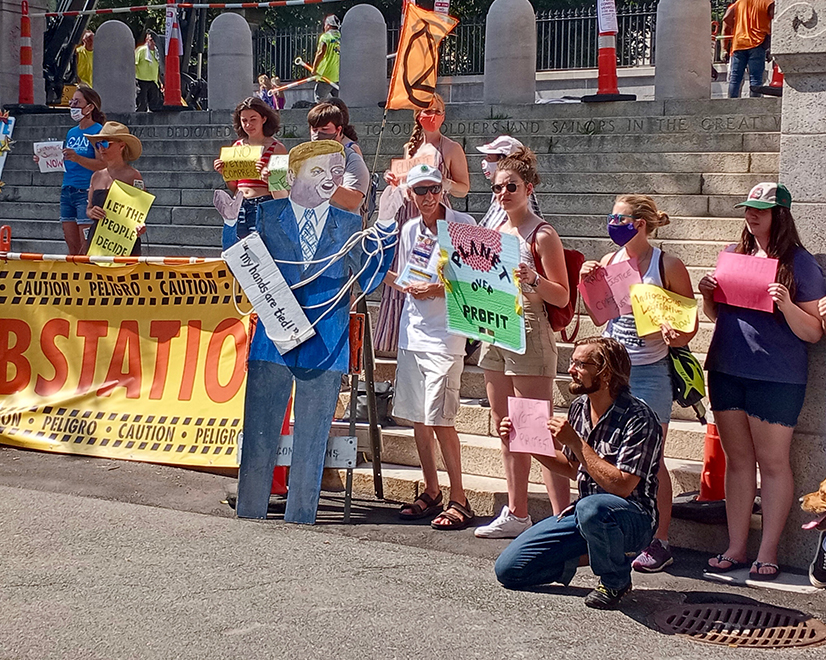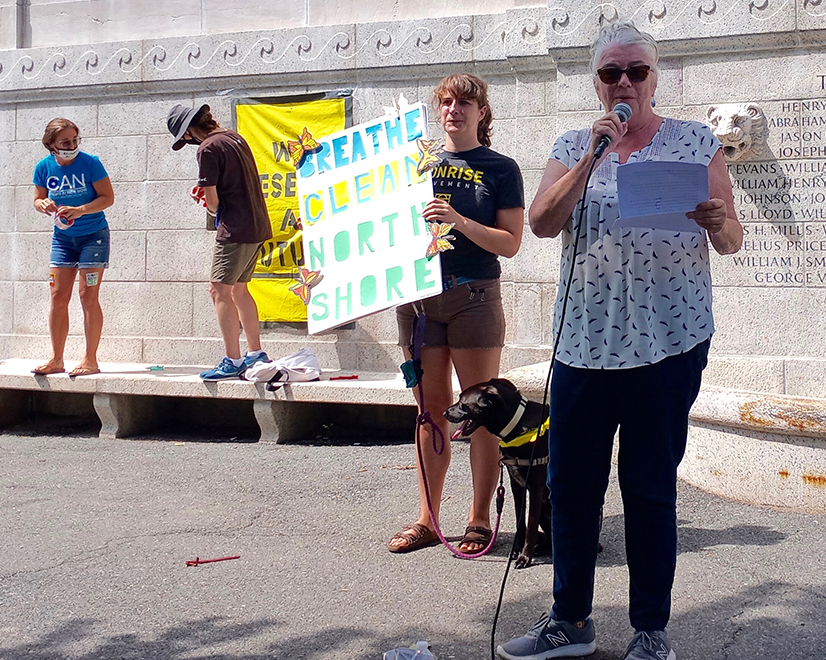
Climate activists mobilized in front of the Massachusetts State House on Saturday to criticize Gov. Charlie Baker and the state Department of Public Utilities (DPU) for supporting fossil-fuel infrastructure development in environmental justice communities.
The protest followed DPU’s approval of Massachusetts Municipal Wholesale Electric Co.’s (MMWEC) request for two $85 million bonds to build a natural gas plant in Peabody, Mass.
“They can’t have it both ways,” said Sudi Smoller, a spokesperson for grassroots group Breathe Clean North Shore, at the protest Saturday.
State leaders, Smoller added, cannot claim Massachusetts is a champion of clean energy and build a new fossil-fuel plant within a mile of eight environmental justice communities made up of minority and low-income residents.
“It goes against a provision of their Next Generation Climate Bill,” she said.
Under the new climate law signed by Baker earlier this year, any project that could affect air quality — including fossil-fuel power plants — proposed within five miles of a state-mandated environmental justice neighborhood will be required to submit an environmental impact report.
The Peabody Municipal Light Plant recently decommissioned one of its two existing peaker plants after analyzing the new environmental justice areas designated in June based on the 2020 census.
“Whatever was reviewed in 2015 should be reviewed again,” Smoller said.

MMWEC’s 55-MW peaker plant has been in the works since 2015. It would provide power for 14 communities and is expected to run 239 hours per year, emitting 7,085 tons of CO2 per year, according to the company.
But plans to build the plant were put on hold in May by MMWEC to address the environmental and health concerns raised by residents and advocacy groups, according to a statement released by the company.
Technology has changed since the project was first proposed more than five years ago, necessitating a design review, CEO Ron DeCurzio said in the statement.
Last month, MMWEC said in a subsequent statement the company feels it has adequately addressed the concerns of public officials. MMWEC eliminated a 200,000-gallon oil tank from its plans for the plant.
However, 87 Massachusetts health care professionals wrote in a letter to MMWEC that they oppose the plant entirely.
“The residents of Peabody currently have higher than state average rates of air-pollution related illnesses, and the air pollution associated with the new plant will increase mortality within the Peabody community,” the health professionals wrote.
For every 10 micrograms/cubic meter of air (ug/m3) increase of particulate matter 2.5 (PM2.5) pollution, all-cause mortality increases by 7.3%.
The Peabody Peaker Plant is projected to increase PM2.5 pollution to 21.3 ug/m3 and “can be expected to increase mortality rates in the surrounding communities,” according to the letter.
A recent study by the nonprofit research group Physicians, Scientists and Engineers for Healthy Energy suggests that peaker plants in Massachusetts are good targets for replacement with solar power and batteries.
Breathe Clean North Shore has started a petition for DPU and MMWEC to listen to the health professionals and conduct a comprehensive, up-to-date environmental and public health impact study of the plant.


